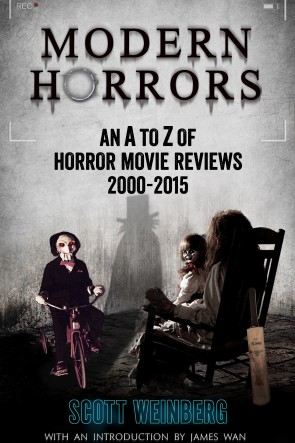Retro Review: CITADEL (2012){0}
One of the cool things that horror films can do is take topical and timely cultural issues, and then expand upon them in a variety of generally unpleasant ways. Pick any “based on actual events” film about a serial killer, Silence of the Lambs for example, or think of films like Battle Royale or The Strangers: horror movies that use today’s headlines as a jumping-off point. The gloomy, moody, and simply effective new Irish movie Citadel falls into the latter category: it takes the simple inner-city issue of “dangerous youth” and delves into its cultural impact through the use of a basic but well-crafted terror tale.
Between recent exports like Outcast, Grabbers, Wake Wood, and Citadel, it sure looks like Ireland is moving up the ladder of global horror cinema these days. Written and directed by Ciaran Foy, Citadel may wear its “social commentary” on its sleeve — it’s so there it’s barely subtext — but at least it’s a somber, restrained creeper of a story that starts out with a nasty twist, slows down for a little while, and then ends up in some admirably unsettling places. There’s not much here for the hyperactive horror crowd, aside from perhaps a few nasty bits near the end, but that only helps the straight-faced horror film to build up a nice head of creepy steam.
The story is a sad, simple one: the melancholy and agoraphobic Tommy (an excellent Aneurin Bernard) is haunted by the memory of his young wife’s recent murder, and he remains steadfastly locked behind his apartment door, with his baby daughter as his only company. Tommy begins making small steps with support groups and the aid of an empathetic nurse — but he remains terrified of the young hooligans who viciously killed his pregnant wife. Indeed, every hood-wearing young man who enters Tommy’s field of view is seen as a faceless threat, so much so that he cravenly walks away, but once he learns a few local legends from a priest (an essentially colorful James Cosmo), our meek and wounded protagonist starts to grow a small dash of hope and courage.
And that’s when a bunch of “faceless” young invaders breaks in to the locked apartment and steals Tommy’s baby.
Although a thoughtful and clearly insightful indictment of how “hooligans” run wild in the inner-city streets, Citadel suffers a touch from underlining its points too thoroughly. The feral youths who torment Tommy clearly represent all thuggish young troublemakers. Tommy, firmly “safe” within his locked apartment with a small baby to protect, clearly represents the average citizen who happens to live in proximity to loud, angry, often violent young criminals. The priest, and a small boy he watches over, also have their own plainly-labeled hats to wear in this play of basic metaphors, but hey, Mr. Foy has something he’d like to say, and he’s doing it through a low-key but entirely compelling little horror flick. If he happens to make his “message” easy to find, that’s a relatively small complaint.
Consistently well-performed by the whole cast (Wunmi Musaku as the kindhearted nurse is also a highlight), backed by a fine score, and effectively presented with bleak, gloomy exteriors and dark, sharp shadows, Citadel employs simple and effective horror tropes in service of a film that has something a little bit angry to say about crime in low-income neighborhoods, but says it in a frank and starkly entertaining fashion.








